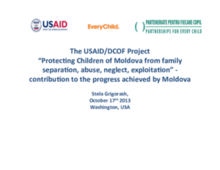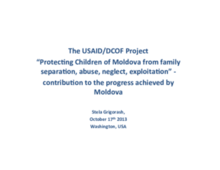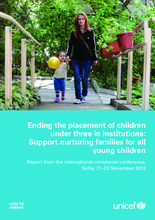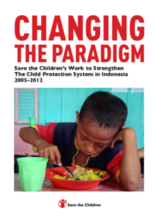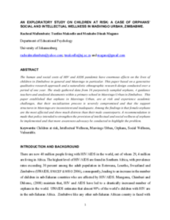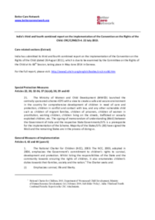Displaying 371 - 380 of 513
The first of two important presentations by Dr. Stela Grigorash, the Director of Partnerships for EveryChild Moldova, on the important work and lessons learnt in reforming the care system in that country.
The second of two important presentations by Dr. Stela Grigorash, the Director of Partnerships for EveryChild Moldova, on the important work and lessons learnt in reforming the care system in that country.
This Report from the international ministerial conference, held in Sofia, 21–22 November 2012, entitled 'Ending the placement of children under three in institutions: support nurturing families for all young children', brings together the presentations, political commitments and priority actions identified by the participants, including 20 governments from Eastern Europe and Central Asia.
This report documents the work conducted by Save the Children in collaboration with the Indonesian Ministry of Social Affairs over a period of 7 years to strengthen the national child protection system and change the underlying paradigm for that system away from over-reliance on residential care and towards child and family centered responses.
This report seeks to increase understanding of the need for, and the process of, conducting outcome evaluations of parenting programmes in low- and middle-income countries. The guidance is aimed at policy-makers; programme planners and developers; high-level practitioners in government ministries; representatives of nongovernmental and community-based organizations; and donors working in the area of violence prevention.
The present study explored the changes resulting from the Teenage Mothers Project (TMP) in Eastern Uganda, a program that empowers unmarried teenage mothers to cope with the consequences of early pregnancy and motherhood, as well as factors that either enabled or inhibited these changes.
This paper by the Brookings Center on Children and Families examines the scope of parenting interventions in the US that directly address poor parenting, as research has found how much parenting matters.
This study funded by Big Lottery and undertaken in partnership between the University of Bristol and Buttle UK, a grant-giving charity for vulnerable children, aims to fill gaps in understanding about the experiences of children living with kins, and in particular how children in informal kinship care view their situation.
The study gathered data from 16 purposively sampled orphans, 4 guidance teachers and analysed documents within a primary school in Masvingo Urban in Zimbabwe.
India submitted its third and fourth combined report on the implementation of the Convention on the Rights of the Child.

